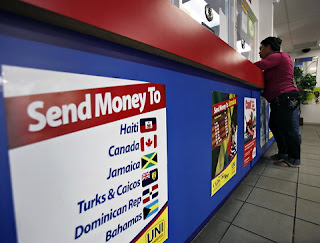Although technology has improved the process in
recent years, it could still cost you dearly to send money abroad. Read on for
the most cost-effective and efficient ways to make that transfer.
Free bank account transfers.
The simplest way is also the obvious one when it
comes to international finance. If you need to transfer funds between a UK bank
account and a foreign one, several of the major UK names will do this without
charge. This usually involves a partner bank in another country or the services
of an international payments company. These are often available online or by
telephone banking to make transfers quickly and easily.
However, this option is only feasible if
yourself and the recipient abroad both have an account to transfer between.
While it's ideal if you're setting up regular payments to a second home abroad
or want to send money to Africa for a relative, for example, bank transfers are not usually possible
for payments at short notice.
One-off small amounts.
There are many online services now that allow
you to make a quick transfer for anything from paying for goods bought over the
internet, to helping out someone in need overseas. Traditional transfer
operators are also still a good option if it's an emergency, such as a family
member on a gap year who needs you to send money to Africa or South-East Asia,
providing it's a relatively small amount.
Most UK transfer operators have agents in numerous
countries worldwide and can make almost instantaneous payments within around
ten minutes, depending on where the recipient is in relation to the pick-up
point. The sender will be given a reference number, which they must pass on to
the person at the other end. With this option, both the sender and the
recipient have to provide proof of identity.
Larger payments.
Amounts higher than 5000 may need to be
sent through alternative channels to avoid overblown rates. Foreign Exchange
brokers are the best way to go here as they specialise in this type of payment,
but it's important to get a range of quotes to compare the difference. This
option may only be worthwhile if making a large spend on something like a house
or car abroad, or even if you are emigrating yourself.
Specialist credit cards.
If you're likely to be spending abroad, a credit
card is probably the easiest solution. Take a regular credit card on holiday
and you will be able to withdraw money from a home account at ATMs as well as
buy directly, but most add hefty percentages on top of the exchange rate.
However, special accounts for overseas spending come with lower exchange rates
and reduced fees. It makes financial sense to do some research and compare the
best companies to go with before travelling. You could also use this option to
pay bills on homes abroad.
International financial transfers can be hugely
expensive in terms of currency and fees, so it's vital to consider which option
is the most suitable for the amount and purpose of your transfer. Although the
internet has meant that speed is no longer the problem it was in bygone days,
whatever your method of choice, take care to find out the exact amount of local
currency that will reach your recipient after all deductions have been made to
find out if it's worth seeking an alternative.
AUTHOR
BIO
Jonas Long is a frequent blogger on finance as
well as business start-ups and investment. Since a family emergency required
him to send money to Africa in a hurry, he's also lent his personal experience
and given advice on travel and money abroad for various online sites.







